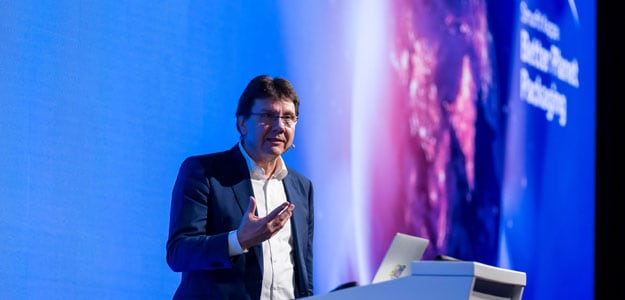Arco Berkenbosch, VP of Innovation & Development, Smurfit Kappa
One year after Smurfit Kappa launched Better Planet Packaging, the initiative is gathering momentum. Arco Berkenbosch, VP of Innovation & Development, is at the helm of the initiative.
Packaging came under the spotlight in 2018 with the harrowing images of the effects that plastic packaging in particular is having on the environment sparking an outcry after David Attenborough’s ‘Blue Planet’ was aired.
As pressure grew on global brands, both from consumers and forthcoming legislation, paper-based packaging is becoming the packaging of choice for many companies.
Smurfit Kappa’s Better Planet Packaging initiative seeks to reduce packaging waste and address the challenge of waste and litter that ends up in oceans and landfill across the world.
As industry leader and sustainability practitioner, Smurfit Kappa felt responsibility to tackle the challenge facing the environment head-on by supporting the concept of circularity and encouraging others to do the same.
Sustainability
Sustainability, and indeed supporting the circular economy, is not new to Smurfit Kappa.
The company launched its twelfth annual Sustainable Development Report earlier this year which reported strong progress on its journey towards becoming a fully sustainable and circular business having met – and in many cases exceeded – most of its long-term sustainability targets years ahead of schedule.
Arco Berkenbosch is the company’s VP of Innovation & Development and is at the helm of the Better Planet Packaging initiative.
“The first thing we have to understand is that the fundamental problem with packaging waste is litter. I’m a true believer in innovation and I think that we need to use all the R&D resources we have across the entire value chain to find ways to collect and handle waste in a controlled away.
Our emphasis needs to be on solving the litter challenge and not waging a war on plastic. In certain contexts plastic is the most suitable material for the purpose.
“End of life is a key consideration for all packaging development because this is when most packaging is at risk of becoming uncontrolled. We should therefore be aiming to develop packaging that has the same life span as the product it packages.”
So what has happened since Better Planet Packaging was launched a year ago?
One year on
“One of the first things we did was to hold a global Design Challenge competition which inspired innovators to put forward solutions for specific areas where we still haven’t got sustainable solutions,” said Mr. Berkenbosch.
“The competition attracted entries from far and wide and the two winners are currently working with a team in Smurfit Kappa to bring their ideas to fruition.”
Smurfit Kappa also held its seventh innovation event which had a Better Planet Packaging theme and record attendance of over 350 customers who have an enormous opportunity to drive change.
Speakers included leading naturalist and wildlife TV presenter, Steve Backshall, who spoke of the first-hand experience he has of the havoc that plastic waste is wreaking on the environment.
Smurfit Kappa’s Better Planet Packaging initiative is also backed up by a growing portfolio of sustainable packaging products which can be used to replace less sustainable materials such as plastic.
These include its paper-based pizza discs which are a recyclable alternative to the polystyrene versions that are used by many food providers and its honeycomb paper-based material that was used by Scania as a replacement for the expanded polystyrene that was previously used to protect windscreens during transit.
What next?
The packaging leader is also working with several UK retailers to support them in their goal of having plastic-free aisles by 2025.
And what can we expect to see next? A lot more, according to Mr. Berkenbosch.
“A key part of the Better Planet Packaging initiative is to form the right partnerships.
We can’t do this alone – it’s a huge, huge issue that demands the best minds in many industries and a collaborative approach.
“We see ourselves as a leader in setting the agenda but the truth is that we don’t know where this journey will end.”

